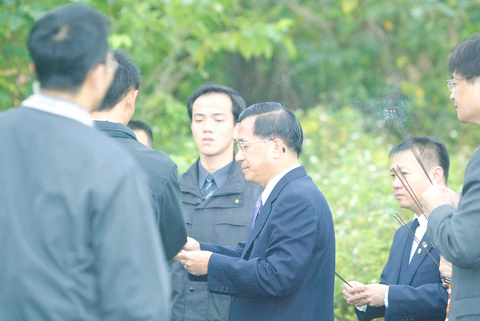President Chen Shui-bian (陳水扁) paid his respects to the late Huang Hsin-chieh (黃信介), his mentor and a pioneer in Taiwan's democratic development yesterday.
Accompanied by Huang's younger brother Huang Tien-fu (黃天福) and his widow, Democratic Progressive Party (DPP) Legislator Lan Mei-chin (藍美津), Chen visited Huang's tomb at a cemetery in Pali (八里), Taipei County.
Chen kept a low profile during the visit.

PHOTO: WU CHIA-YI, TAIPEI TIMES
After burning incense and bowing before the late Huang's tomb, the president chatted with Huang's family members for 20 minutes, according to Ma Yung-cheng (馬永成), deputy secretary-general of the Presidential Office.
Chen made no public statement, but he prayed that Huang's spirit will give him strength and guidance to continue on the path of reform, Ma said.
Ma also quoted the president as saying that he couldn't come to Huang's cemetery earlier because he was in southern Taiwan stumping for DPP candidates, so he decided to visit yesterday, which was the 26th anniversary of the Kaohsiung Incident.
The incident, in which police cracked down on a peaceful rally to mark Human Rights Day on Dec. 10, 1979, is generally recognized as an important turning point in Taiwan's transition to democracy.
Chen said Huang, a former DPP chairman, is the perennial spiritual leader of the party, which stands for the pursuit of the ideals of democracy, freedom, human rights, social justice, protection of the disadvantaged, as well as Taiwan first, Ma said.
On questions regarding the administration's lineup now that Su Tseng-chang (蘇貞昌) has stepped down as DPP chairman to take responsibility for the party's election loss and a possible Cabinet reshuffle, Ma said that the president will reveal his ideas after careful consideration.
Lan said the president has visited the late Huang's tomb every year since Huang passed away on Dec. 30, 1999 to pay his respects.
She said that the president shouldn't shoulder the responsibility for the election defeat alone, because he had worked hard during the campaign. She said the DPP should continue on the path of reform.

Nipah virus infection is to be officially listed as a category 5 notifiable infectious disease in Taiwan in March, while clinical treatment guidelines are being formulated, the Centers for Disease Control (CDC) said yesterday. With Nipah infections being reported in other countries and considering its relatively high fatality rate, the centers on Jan. 16 announced that it would be listed as a notifiable infectious disease to bolster the nation’s systematic early warning system and increase public awareness, the CDC said. Bangladesh reported four fatal cases last year in separate districts, with three linked to raw date palm sap consumption, CDC Epidemic Intelligence

Two Taiwanese prosecutors were questioned by Chinese security personnel at their hotel during a trip to China’s Henan Province this month, the Mainland Affairs Council (MAC) said yesterday. The officers had personal information on the prosecutors, including “when they were assigned to their posts, their work locations and job titles,” MAC Deputy Minister and spokesman Liang Wen-chieh (梁文傑) said. On top of asking about their agencies and positions, the officers also questioned the prosecutors about the Cross-Strait Joint Crime-Fighting and Judicial Mutual Assistance Agreement, a pact that serves as the framework for Taiwan-China cooperation on combating crime and providing judicial assistance, Liang

Reports of Taiwanese going missing, being detained or interrogated, or having their personal liberties restricted in China increased about fourfold annually last year, the Mainland Affairs Council (MAC) said yesterday. Last year, 221 Taiwanese who traveled to China were reported missing, were detained and interrogated, or otherwise had their personal freedom restricted, up from 55 the previous year, the council said. Reopening group tours to China would be risky, as it would leave travelers with no way to seek help through official channels after Beijing shut down dialogue between the associations tasked with handling cross-strait tourism, the MAC said. Taipei’s Taiwan Strait Tourism

SHIFT: Taiwan is evolving from a transit stop into a tourist destination, with more international travelers willing to spend on tours, dining and cultural activities Taiwan rose three places in the World Tourism Barometer to 36th globally in 2024, with international tourism revenue of US$10.028 billion, the Tourism Administration said on Monday. The UN Tourism Organization publication said that its focus has switched from whether a country has returned to pre-COVID-19 levels of tourism to the amount spent by a tourist during an overseas trip. The nation last year welcomed 8.57 million international tourists, about 9 percent more than in 2024, with most tourists coming from Japan, South Korea, and Hong Kong and Macau, all of which accounted for at least 1 million tourists each. During the first